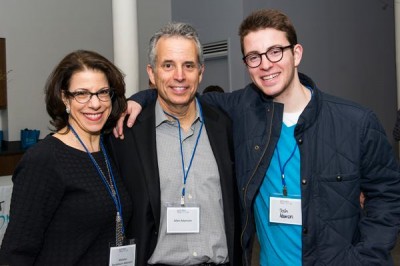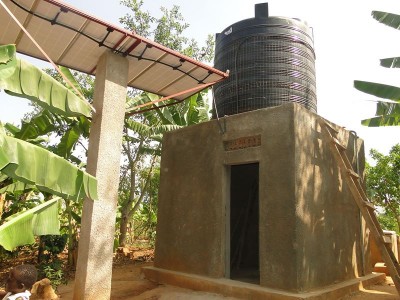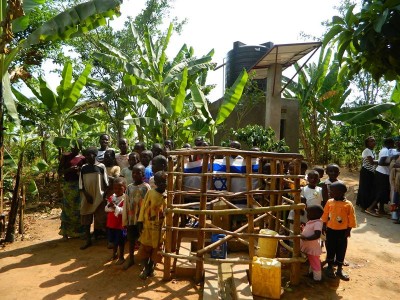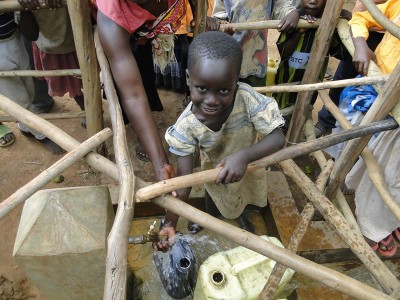
A mother wakes up and prepares for the day. The routine sounds normal: get the children ready for the day, cook, clean and provide for the family. But, what if it took six hours just to get water?
This problem is real for Sub-Saharan African communities. It takes the majority of the day just to bring water back home. Even then, the water is rarely clean enough for human consumption.
With no light and no power, those six hours are valuable. Instead of finding means to support a family or perform other duties, a large portion of the day’s light is spent retrieving water. It’s a cycle well known to the community of Kolonyi, Uganda, until a boy in New York decided to make a difference.
Motivated by his Bar Mitzvah, Josh Adamson decided to make an impact not only in his community but halfway around the world. For him, Tikkun Olam, the responsibility to heal and transform the world, is a part of the responsibility of being called to Torah.
For Adamson, it was a responsibility he took head on. While it takes months for a B’nai Mitzvah to prepare to be called to Torah, Adamson was determined to do something special from a young age.
After learning about how $15 mosquito nets were saving countless lives in Africa from malaria in sixth-grade, he convinced his homeroom class to hold a bake sale raising money to buy as many of them as possible. It proved hugely successful.
“I felt that I still wanted to help people in Africa, as I learned more about how life is such a struggle there. I didn’t know how or what to do, I just knew I had to help. Then, I read an article about the lack of clean water in many African villages. Right then and there I realized what I wanted to do.”
As he was preparing for his Bar Mitzvah, Josh took his vision one big step further. He set his mind on the Innovation: Africa Mitzvah Campaign.
Though Josh’s mother Madelyn Adamson originally thought her son should focus more on Jewish issues at home or in Israel, her son’s passion eventually won her over.
“We loved the fact that this type of project would have such a fundamental impact on a large group of people. I knew that it would be much more difficult to visit the actual project in Africa than something like a playground in Israel or a school library, but we supported Josh’s passion. We did not have any idea that the project would grow in this way,” she said.

Innovation: Africa is a non-profit organization that brings Israeli technology and innovations to villages throughout Africa. Founded in 2008, the organization has provided light, clean food, water and proper medical care to nearly 500,000 people in Ethiopia, Malawi, Uganda and Tanzania according to its Web site.
The Mitzvah Campaign allows for B’nai Mitzvah students to donate toward providing Israeli solar energy technology to schools and medical clinics and community centers in rural Africa. After some tests of the environment and in a handful of villages, the project found a home in Uganda.
“Our Bar and Bat Mitzvah campaigns are particularly special given our dual mission to save African lives while improving Israel’s image around the world. It provides young people with a way to be part of a global movement, while also connecting to their Jewish identity and the Jewish state,” said Emma Goldman, Outreach Coordinator for Innovation: Africa.
Kulonyi, Uganda is home to nearly 200 families and two villages of just under 3,000
people. Josh set out to raise money to bring clean water to the area on a consistent basis.
“I guess in the beginning I didn’t even realize how big a deal this process was. After I raised a couple thousand dollars, I was tired of baking and asking people for money. But honestly, throughout the whole process it never escaped my mind that this well would change the lives of a lot of people, and maybe even save some lives. It would give everyone in the village a new future,” Josh said.

His project did exactly that. On March 22, World Water Day 2014, the two-year project was completed. By then, Josh had raised $20,000, which provided 12 solar-powered, clean-water taps. Helped by $10,000 from the Jewish Women’s Foundation of New York, Josh was able to complete the largest installation in Innovation: Africa history.
For one African community, dirty water is a thing of the past. For Josh, it was just a beginning. His mitzvah project left a lasting impression.
“This project had a big impact on Josh. It clearly empowered him in many ways. He saw that he could actually make something happen, that his efforts could have a tangible impact on so many people, and that he could be a leader and get other kids to believe in the things that are important to him,” Madelyn said.
Now 15, Josh has continued to pursue his dreams of changing the world.
Over Presidents’ Day weekend, Josh and other members of his synagogue traveled to the Dominican Republic for a community service project. He is also an active member of the United Jewish Appeal-New York serving as Senior Fellow in the Teen Leadership Philanthropy Council.
Josh’s message to the community and to the world is a theme that has been at the heart of Judaism throughout its history. No matter how big the obstacle or how small the numbers, people can make a difference in the world.
“I think the biggest thing I have taken away from this experience has been that I can make a difference, even as a teenager,” he said.
“Josh’s work exemplifies our work in the sense that it goes to show that a little bit of light can go a long way. One light bulb in a rural African classroom can provide hundreds of students with a place to study after the sun goes down and a chance at a brighter future. So too, one kid who was determined to use his Bar Mitzvah to bring clean water to people around the world mobilized his community to make this a reality,” Goldman said.
For the first time, one African community had access to clear water, better health care and brighter opportunities. Instead of fetching water, people can farm, go to school and even sell goods. Thanks to the vision and dedication of one young man and the support of a family and community, the world—especially one small corner of it in Africa—is a brighter place.

Eric Steitz is a recent graduate of Hastings College in Nebraska.

